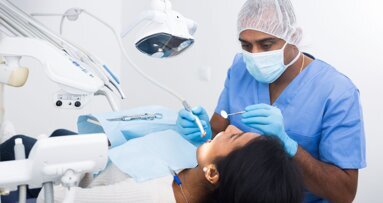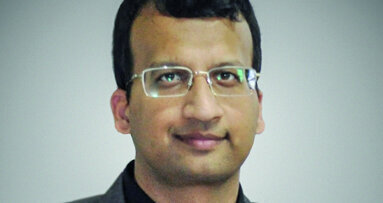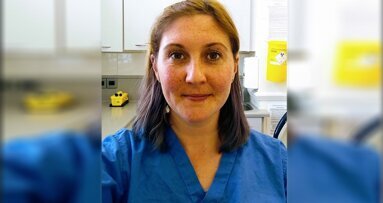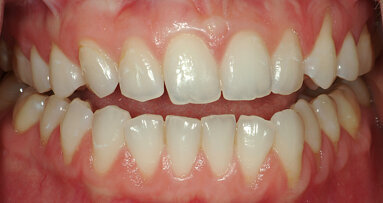Everyone has done it—searching for symptoms on the Internet. Recent statistics show that searches for dental and mouth-related problems are very common in Europe. On average, Europeans generate over 200,000 searches per month for toothache alone. This benefits patients by assisting them in taking responsibility for their own health, but unfortunately self-diagnosing on the Internet can sometimes do more harm than good. Self-diagnosis can fuel anxiety and hypochondria, and some websites provide unreliable information. In an interview with Dental Tribune International, Dr Chun Tang, of Pall Mall Medical in Manchester in the UK, shared some tips for dental professionals on how to educate patients about this matter.
Dr Tang, according to the statistics released by Lenstore, dental and oral health-related searches are very common. What do you think the reasons are for so many people consulting the Internet?
Easy accessibility is just one of the many reasons why dental and oral health-related searches are common. Not everyone has access to a dentist, and the Internet has given patients the ability to find information at their own convenience, especially during a global pandemic where many feel uncomfortable going to a clinic or are unable to make an appointment. Furthermore, searching for information on symptoms allows patients to take some responsibility for their own health. They can reassure themselves by finding relevant information written by healthcare professionals on a variety of reliable websites.
What advice would you give to dentists who are dealing with patients who search for information about their symptoms on the Internet and either come in too often because they are scared or come in too late because they thought they could self-manage and were unsuccessful?
If patients insist on researching their symptoms online, make them aware of the websites they should avoid. Encourage them to use only reliable websites that provide helpful information, as these sites will usually tell them what the red flags are and when they should contact a healthcare professional.
Dentists can also offer patients different ways in which to contact them in order to prevent them coming in too often. Offering patients the chance to have consultations via email, text or even video call can be a great way to determine whether further action is required, and this is beneficial for both dentist and patient. It is important to remember that prevention is the key with most diseases—if something is caught early, it can be managed better. Reaffirm to patients that there is nothing wrong with checking their symptoms on the Internet, but this should only be done in order to assist their understanding of their condition and should in no way replace the dentist.
People will probably continue to check online for information about their symptoms despite the risks, simply because it is so tempting and convenient. How can dental healthcare professionals help guide their patients to the right resources? What should be the ultimate goal in the dentist–patient relationship?
As millions of people now own a smartphone, researching symptoms on the Internet has become second nature to so many of them. Firstly, it is important that dental healthcare professionals guide their patients to correct and reliable sources of information in order to ensure that they are not harming themselves. Secondly, patients should be made aware of recognised and trustworthy websites as well as the ones that they should avoid as biased. The latter could be promoting their own products and presenting incorrect information that does not have patients’ best interests at heart. Lastly, open communication is the most important factor for both patients and dentists and should be the ultimate goal. People will always research their symptoms online, but giving patients the correct information about how to do it properly can prevent many unnecessary problems.
Tags:
BOLOGNA, Italy: At the annual meeting of the Channel3 group of key opinion leaders, held this year in June in Bologna in Italy, the fourth P-I Brånemark ...
The integration of digital dentistry into existing workflows has become increasingly popular as newer technologies have been developed. Though this approach...
From 22 to 25 September, Cologne will once again become the place to be for dental professionals when the 39th edition of IDS takes place. Mark Stephen ...
A 2013 graduate of Leipzig University in Germany, Dr Michaela Sehnert currently runs her own dental practice in the nearby city of Halle (Saale). In this ...
LONDON, England: National Health Service (NHS) dentistry is in crisis, and at the heart of the problem is the alarming loss of dental professionals. ...
CHICAGO, U.S.: At the 2017 Greater New York Dental Meeting, 3DISC launched its Heron IOS intraoral scanner to the world. Three months later, the ...
Specialised in periodontology and oral implantology, Dr Rajiv Saini is an avid lecturer in both fields. He is Editor-in-Chief of the International Journal ...
Whether or not to provide dental treatment for patients with drug dependencies can be a difficult decision for dentists to make. Dental Tribune ...
What do dentists want to know about occlusion? Occlusion may appear complicated because of the multiple factors involved, such as teeth, muscles and the ...
Live webinar
Tue. 24 February 2026
1:00 pm EST (New York)
Prof. Dr. Markus B. Hürzeler
Live webinar
Tue. 24 February 2026
3:00 pm EST (New York)
Prof. Dr. Marcel A. Wainwright DDS, PhD
Live webinar
Wed. 25 February 2026
11:00 am EST (New York)
Prof. Dr. Daniel Edelhoff
Live webinar
Wed. 25 February 2026
1:00 pm EST (New York)
Live webinar
Wed. 25 February 2026
8:00 pm EST (New York)
Live webinar
Tue. 3 March 2026
11:00 am EST (New York)
Dr. Omar Lugo Cirujano Maxilofacial
Live webinar
Tue. 3 March 2026
8:00 pm EST (New York)
Dr. Vasiliki Maseli DDS, MS, EdM



 Austria / Österreich
Austria / Österreich
 Bosnia and Herzegovina / Босна и Херцеговина
Bosnia and Herzegovina / Босна и Херцеговина
 Bulgaria / България
Bulgaria / България
 Croatia / Hrvatska
Croatia / Hrvatska
 Czech Republic & Slovakia / Česká republika & Slovensko
Czech Republic & Slovakia / Česká republika & Slovensko
 France / France
France / France
 Germany / Deutschland
Germany / Deutschland
 Greece / ΕΛΛΑΔΑ
Greece / ΕΛΛΑΔΑ
 Hungary / Hungary
Hungary / Hungary
 Italy / Italia
Italy / Italia
 Netherlands / Nederland
Netherlands / Nederland
 Nordic / Nordic
Nordic / Nordic
 Poland / Polska
Poland / Polska
 Portugal / Portugal
Portugal / Portugal
 Romania & Moldova / România & Moldova
Romania & Moldova / România & Moldova
 Slovenia / Slovenija
Slovenia / Slovenija
 Serbia & Montenegro / Србија и Црна Гора
Serbia & Montenegro / Србија и Црна Гора
 Spain / España
Spain / España
 Switzerland / Schweiz
Switzerland / Schweiz
 Turkey / Türkiye
Turkey / Türkiye
 UK & Ireland / UK & Ireland
UK & Ireland / UK & Ireland
 Brazil / Brasil
Brazil / Brasil
 Canada / Canada
Canada / Canada
 Latin America / Latinoamérica
Latin America / Latinoamérica
 USA / USA
USA / USA
 China / 中国
China / 中国
 India / भारत गणराज्य
India / भारत गणराज्य
 Pakistan / Pākistān
Pakistan / Pākistān
 Vietnam / Việt Nam
Vietnam / Việt Nam
 ASEAN / ASEAN
ASEAN / ASEAN
 Israel / מְדִינַת יִשְׂרָאֵל
Israel / מְדִינַת יִשְׂרָאֵל
 Algeria, Morocco & Tunisia / الجزائر والمغرب وتونس
Algeria, Morocco & Tunisia / الجزائر والمغرب وتونس
 Middle East / Middle East
Middle East / Middle East











































To post a reply please login or register